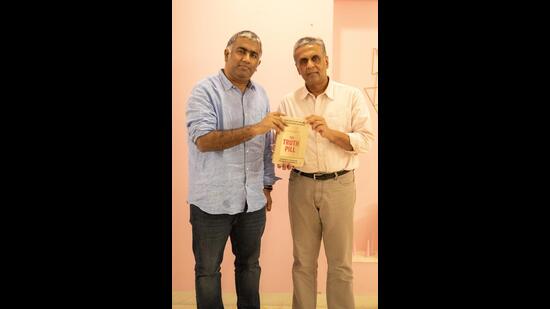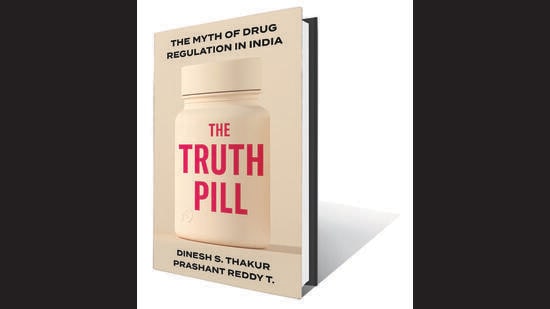Review: The Truth Pill; The Myth of Drugs Regulation in India byDinesh S Thakur and Prashant Reddy T
For most of us, a doctor’s orders are sacrosanct; stick to the prescription, don’t miss a dose, and complete that course of antibiotics. The ritual cannot and should not be altered. It isn’t until the side effects of a particular drug begin to surface that the individual feels compelled to deliberate on the intricacies of medical science, and more importantly, the composition of the bitter pill they have been asked to swallow.
In The Truth Pill: The Myth of Drug Regulation in India, chemical engineer Dinesh S Thakur and lawyer Prashant Reddy T not only expose episodes of immorality among drug regulatory bodies in India (manufacturing and trade), but lay bare flaws in the judicial structure and a complicit establishment that plays along.
They begin their investigation with the incident in January 2020 when 11 children from Jammu & Kashmir’s Udhampur district died of a mysterious disease after consuming a cough syrup called COLDBEST, manufactured by Digital Vision, a pharmaceutical company based in Himachal Pradesh.
According to the authors, when the Regional Drug Testing Laboratory, Chandigarh, tested the samples of the batch of COLDBEST, they alleged that the cough syrup tested positive for high percentages of “diethylene glycol” (DEG), a powerful industrial solvent used in the manufacture of anti-freeze, brake fluid etc. It is never used in the manufacture of medicine and can be fatal to humans who consume it as it causes the kidneys to fail, which can eventually lead to death.
The book claims that DEG adulteration is a recurring issue and the primary reason for this is that many Indian pharmaceutical companies fail to test the raw materials or final formulation before it’s shipped to the market for sale. Nearly two years have passed and there have been no legal implications of this violation and negligence, and Digital Vision is yet to be prosecuted for the death of the children.
Coincidentally, Dinesh and Prashant’s book comes out not long after a similar and more recent incident in August 2022, when 66 children died in the West African nation of Gambia after consuming Indian made cough syrups. Manufactured by Haryana-based Maiden Pharmaceuticals Ltd, the cough syrup samples underwent a series of laboratory tests which “confirmed that they contain unacceptable amounts of diethylene glycol (DEG) and ethylene glycol as contaminants,” according to the World Health Organization (WHO).
Apparently, illegal and unchecked pharmaceutical practices are rampant. The Truth Pill digs uncovers several other irregularities that force the consumer to wonder whether her handy medical kit containing common OTC drugs and other prescribed pills can be trusted at all.
The first is the manufacturing and trade of NSQ (Not of Standard Quality) drugs. A drug is declared as NSQ when it fails the quality tests prescribed in the legally recognized pharmacopoeia. In the Indian market, the trade of such drugs is widespread. Contaminations include glass particles and bacterial endotoxins, both of which can have dangerous consequences for patients, ranging from aseptic shock to death.
Acquittals and sentencing of companies and people carrying out these illegal practices tends to be long-drawn-out and ineffective. Administrative measures are taken to suspend or cancel manufacturing licenses but that is hardly a substitute for criminal punishment for endangering lives.
Then comes traditional Indian medicine, popularly known as Ayurveda, which is believed to be less toxic than modern medicine. While Ayurvedic medicine has its roots in herbal cures, American studies have found the presence of “heavy metals” in them. Indian origin patients in the United States have fallen sick due to heavy metal poisoning after consuming certain Ayurvedic supplements. Doctors in India too have repeatedly reported metal poisoning in patients with a history of consuming Ayurvedic cures.

The problem here also is that Ayurvedic cures, unlike modern medicine, can be administered without the prescription of a qualified doctor. The presence of heavy metals isn’t the only issue. There have been instances of the surreptitious mixing of steroids in Ayurvedic powders that claim weight gain or loss, the injection of Sildenfil, more commonly known as Viagra, into Ayurvedic pills meant to boost sexual vigour, and the mixing of these drugs with powerful painkillers.
Despite these revelations, the penalties are relatively light. At most, a fine of ₹20,000 and a maximum prison term of one year can be imposed on a person found to be selling adulterated Ayurvedic “cures”.
A former director of project and information management at Ranbaxy, Dinesh Thakur’s exposé of the pharmaceutical giant’s fraud back in 2013 was well documented in his book Bottle of Lies: Ranbaxy and the Dark Side of Indian Pharma. He resigned and became a whistleblower to the US Food and Drug Administration, and ultimately brought the multibillion-dollar behemoth to its knees.
His second book co-authored with intellectual property lawyer Prashant Reddy T is equally illuminating. Here’s hoping recent events and the scrutiny of them by books like this one will lead to the implementation of active drug regulatory policies along with a stringent public law, eventually ending unethical drug practices in the world of Indian medicine.
Arunima Mazumdar is an independent writer. She is @sermoninstone on Twitter and @sermonsinstone on Instagram.
For most of us, a doctor’s orders are sacrosanct; stick to the prescription, don’t miss a dose, and complete that course of antibiotics. The ritual cannot and should not be altered. It isn’t until the side effects of a particular drug begin to surface that the individual feels compelled to deliberate on the intricacies of medical science, and more importantly, the composition of the bitter pill they have been asked to swallow.
In The Truth Pill: The Myth of Drug Regulation in India, chemical engineer Dinesh S Thakur and lawyer Prashant Reddy T not only expose episodes of immorality among drug regulatory bodies in India (manufacturing and trade), but lay bare flaws in the judicial structure and a complicit establishment that plays along.

They begin their investigation with the incident in January 2020 when 11 children from Jammu & Kashmir’s Udhampur district died of a mysterious disease after consuming a cough syrup called COLDBEST, manufactured by Digital Vision, a pharmaceutical company based in Himachal Pradesh.
According to the authors, when the Regional Drug Testing Laboratory, Chandigarh, tested the samples of the batch of COLDBEST, they alleged that the cough syrup tested positive for high percentages of “diethylene glycol” (DEG), a powerful industrial solvent used in the manufacture of anti-freeze, brake fluid etc. It is never used in the manufacture of medicine and can be fatal to humans who consume it as it causes the kidneys to fail, which can eventually lead to death.
The book claims that DEG adulteration is a recurring issue and the primary reason for this is that many Indian pharmaceutical companies fail to test the raw materials or final formulation before it’s shipped to the market for sale. Nearly two years have passed and there have been no legal implications of this violation and negligence, and Digital Vision is yet to be prosecuted for the death of the children.
Coincidentally, Dinesh and Prashant’s book comes out not long after a similar and more recent incident in August 2022, when 66 children died in the West African nation of Gambia after consuming Indian made cough syrups. Manufactured by Haryana-based Maiden Pharmaceuticals Ltd, the cough syrup samples underwent a series of laboratory tests which “confirmed that they contain unacceptable amounts of diethylene glycol (DEG) and ethylene glycol as contaminants,” according to the World Health Organization (WHO).
Apparently, illegal and unchecked pharmaceutical practices are rampant. The Truth Pill digs uncovers several other irregularities that force the consumer to wonder whether her handy medical kit containing common OTC drugs and other prescribed pills can be trusted at all.
The first is the manufacturing and trade of NSQ (Not of Standard Quality) drugs. A drug is declared as NSQ when it fails the quality tests prescribed in the legally recognized pharmacopoeia. In the Indian market, the trade of such drugs is widespread. Contaminations include glass particles and bacterial endotoxins, both of which can have dangerous consequences for patients, ranging from aseptic shock to death.
Acquittals and sentencing of companies and people carrying out these illegal practices tends to be long-drawn-out and ineffective. Administrative measures are taken to suspend or cancel manufacturing licenses but that is hardly a substitute for criminal punishment for endangering lives.
Then comes traditional Indian medicine, popularly known as Ayurveda, which is believed to be less toxic than modern medicine. While Ayurvedic medicine has its roots in herbal cures, American studies have found the presence of “heavy metals” in them. Indian origin patients in the United States have fallen sick due to heavy metal poisoning after consuming certain Ayurvedic supplements. Doctors in India too have repeatedly reported metal poisoning in patients with a history of consuming Ayurvedic cures.

The problem here also is that Ayurvedic cures, unlike modern medicine, can be administered without the prescription of a qualified doctor. The presence of heavy metals isn’t the only issue. There have been instances of the surreptitious mixing of steroids in Ayurvedic powders that claim weight gain or loss, the injection of Sildenfil, more commonly known as Viagra, into Ayurvedic pills meant to boost sexual vigour, and the mixing of these drugs with powerful painkillers.
Despite these revelations, the penalties are relatively light. At most, a fine of ₹20,000 and a maximum prison term of one year can be imposed on a person found to be selling adulterated Ayurvedic “cures”.
A former director of project and information management at Ranbaxy, Dinesh Thakur’s exposé of the pharmaceutical giant’s fraud back in 2013 was well documented in his book Bottle of Lies: Ranbaxy and the Dark Side of Indian Pharma. He resigned and became a whistleblower to the US Food and Drug Administration, and ultimately brought the multibillion-dollar behemoth to its knees.
His second book co-authored with intellectual property lawyer Prashant Reddy T is equally illuminating. Here’s hoping recent events and the scrutiny of them by books like this one will lead to the implementation of active drug regulatory policies along with a stringent public law, eventually ending unethical drug practices in the world of Indian medicine.
Arunima Mazumdar is an independent writer. She is @sermoninstone on Twitter and @sermonsinstone on Instagram.
